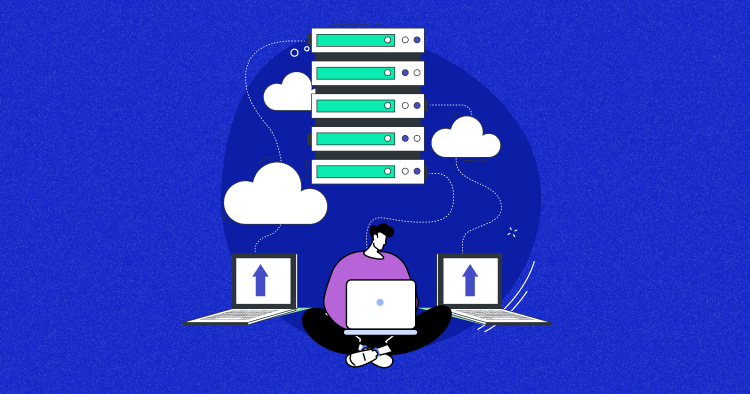
Managing a company’s IT needs can be daunting in the fast-paced and ever-evolving world of technology. There’s much to track, from software updates and cybersecurity threats to hardware malfunctions and network outages.
But what if businesses could hand their IT management responsibilities to a trusted partner? That’s exactly where managed IT services help you out.
In this blog, we’ll explore managed IT services, what they offer, and why they might be the right choice for businesses.
Learn how managed IT services can simplify your technology landscape and help you stay ahead of the game, whether you’re a small start-up or a large enterprise.
- What Are Managed IT Services?
- History of Managed IT Services
- What’s the Difference Between Managed IT Services and Cloud Services?
- Why Do Businesses Choose Managed IT Services?
- The Managed IT Services Model
- Tools Managed Service Providers Use to Deliver Managed IT Services
- Key Considerations for Selecting a Managed IT Service for Businesses
- What Services Do Managed IT Service Providers Offer?
- Summary
What Are Managed IT Services?
A managed service provider (MSP) is a third-party business remotely administering an end-IT user’s infrastructure and applications. MSPs are employed by SMBs, charitable organizations, and governmental organizations for ongoing management tasks, such as network and infrastructure management, security, and monitoring.
Outsourcing IT duties to a vendor can reduce the strain on internal or support teams that cannot meet the IT demands. Managed service providers (MSPs) offer specialized knowledge or skills, covering IT responsibilities 24/7, and can even replace internal teams.
History of Managed IT Services

Earlier, computer repair services followed a break-and-fix model that only needed IT technicians when problems arose and were not available 24/7. This approach proved inefficient and could not keep up with the ever-changing computer systems.
Following this model’s inefficiency managed IT service providers emerged in the late 1990s with the advent of Application Service Providers (ASPs) who facilitated remote support for IT infrastructure. Initially, they were embraced by large companies to manage their IT networks.
The managed IT services model allows companies to outsource their technology management and promptly address any issues, freeing up their internal teams to focus on business operations.
With the rise of cloud computing, cyber security is becoming even more critical, and managed IT services can implement security measures such as multi-factor authentication to safeguard their data.
With the growing significance of technology, 45% of businesses plan to increase their tech spending this year.
What’s the Difference Between Managed IT Services and Cloud Services?

Managed IT services refer to outsourcing an organization’s technology management and maintenance to a third-party provider. This includes tasks such as software updates, security management, and technical support.
Cloud services, on the other hand, deliver computing resources, such as servers, storage, and databases, over the internet on a pay-per-use basis. This allows organizations to consume these resources without the upfront capital expenses of building and maintaining their own infrastructure.
In summary, managed IT services focus on managing an organization’s existing technology infrastructure, while cloud services provide access to remote, scalable, and shared computing resources.
Partner With Cloudways for Hassle-Free Hosting and Recurring Revenue
Say goodbye to hosting headaches and hello to recurring revenue. Partner with Cloudways and offer your clients the best in hassle-free hosting – trusted by 1500+ IT service providers.
Why Do Businesses Choose Managed IT Services?
Here are a couple of reasons why businesses choose to leverage managed IT services:
1. Cost savings: Managed IT services can provide cost-effective solutions for businesses, as they reduce the need for in-house IT staff and hardware expenses.
2. Improved efficiency: Managed IT services can streamline business processes and improve overall efficiency, freeing up time and resources for other important tasks.
3. Proactive maintenance: Managed IT service providers monitor and maintain systems proactively, reducing downtimes and other problems that may disrupt business operations.
4. Access to expertise: Managed IT services offer businesses expert technicians to maintain their systems.
5. Scalability: Managed IT services offer businesses scalability and flexibility to adjust services as needed easily.
6. Enhanced security: Managed IT services enhance business security with protection against data breaches and cyber threats.
7. Improved productivity: Managed IT services improve productivity and job satisfaction by providing employees with reliable, fast, and secure technology.
8. Compliance: Managed IT services help businesses comply with regulations and industry standards, such as HIPAA, PCI, and ISO.
The Managed IT Services Model
Companies can adopt different approaches for using the managed services model for their IT operations, depending on various factors such as the organization’s size, the number of technical staff, budget constraints, etc.
You usually get managed IT services at a fixed and recurring cost, divided into different levels with varying automation and management according to an agreed service level agreement. Clients only pay for the services they need and can adjust their level of service according to their changing business needs.
Managed IT services offer essential off-site services, such as remote monitoring and management, help desk support, backup, and disaster recovery, that improve business efficiency and provide cost-effective SaaS solutions.
Managed IT service providers can work:
- As a professional service.
- As an extension of a business’s IT team.
- As a business’s all-in-one IT partner.
Managing IT services does not necessarily replace internal IT professionals, as they still play a crucial role as the point of contact between the MSP and the end user, analyzing reports and providing feedback. With the MSP handling routine tasks, the IT professional can focus on more complex and significant projects, making them more efficient and effective.
In conclusion, managed IT services can benefit businesses of any size and growth stage, providing a valuable resource by freeing up internal workforce resources.
Tools Managed Service Providers Use to Deliver Managed IT Services

MSPs have made significant progress in managed IT services, providing many advanced tools and expertise to resolve issues efficiently. With these tools, MSPs can offer their clients high-quality “white glove” services.
For instance, PSA (Professional Services Automation) software streamlines operations for MSPs by centralizing project management, help desk services, reporting, and billing. MSPs can save time using this software and provide better client services.
MSPs also offer managed IT services 24/7 using other tools, like RMM and BDR, which work together to detect and fix problems before clients become aware of their existence. This approach ensures client data remains secure and many issues can be handled remotely. These tools enable MSPs to offer cost-effective services while providing peace of mind to clients, allowing them to operate their businesses without worries.
Some of the core MSP management tools include:
- RMM – Remote Monitoring and Management
- PSA – Professional Services Automation
- Help Desk
- ITSM – Information Technology Service Management
- Backup and Recovery
- Cloud Migration
- Incident Response
- Ransomware Backup Protection
- PRM – Partner Relationship Management
- CIM – Channel Incentive Management
Key Considerations for Selecting a Managed IT Service for Businesses

When choosing a managed IT service for your business, you must consider several key factors, including:
- Technical expertise and experience: Ensure the MSP has a proven track record and experience in providing IT services to businesses similar to yours.
- Availability of 24/7 support: Choose an MSP that offers round-the-clock support to ensure your IT needs are met whenever they arise.
- Range of services: Ensure an MSP offers a breadth of services, including comprehensive network monitoring and infrastructure management, web hosting, cloud migration, security, and more.
- Security and privacy policies: Your MSP must follow industry-standard security and privacy protocols to keep your data secure.
- Cost and pricing structure: Review the MSP’s pricing model, including monthly fees, project costs, and hidden costs, to ensure it aligns with your budget.
- Reputation and customer reviews: Research the MSP’s reputation, read customer reviews, and speak to existing clients to gauge their satisfaction level.
- Scalability and flexibility: Choose an MSP that can grow and adapt to your changing needs, providing solutions that can be scaled up or down as required.
- Technology and tools used by the MSP: Ensure the MSP uses industry-leading technologies and tools, assuring low risks and high-quality services.
- Customization and personalization options: Check if the MSP offers customized solutions to meet your specific business requirements.
- Service level agreements (SLAs) and response times: Review the MSP’s SLAs and response times to ensure that they align with your expectations for service delivery and problem resolution.
If you’re having a hard time finding a reliable managed IT service provider for your business, don’t worry. I’ve created a list of some highly rated best-managed IT service providers in the USA.
What Services Do Managed IT Service Providers Offer?
It is crucial to carefully review managed services agreements to ensure a clear understanding of their services. These services may encompass:
- Evaluating and monitoring the client’s network.
- Ensuring network security and risk reduction.
- Evaluating the client’s connectivity and data transfer capacity.
- Data storage management.
- Handling installations and upgrades.
- Implementing software updates.
- Providing web hosting services – More than 1500 managed IT service providers offer Cloudways managed web hosting to their clients.
- Providing virtualization and network provisioning.
- Reporting on performance and monitoring.
- Providing technical support via a help desk.
Why Should IT Management Companies Offer Web Hosting?
Offering web hosting services can bring many benefits to IT management companies and help them grow their business in several ways:
- Diversify revenue streams: By offering web hosting, IT management companies can diversify their revenue streams and reduce their dependence on a single service or product. This helps to increase overall revenue and reduce the impact of market fluctuations.
- Strengthen customer relationships: IT management companies can build stronger customer relationships by providing web hosting services. This allows them to showcase their expertise and provide valuable support for their customer’s online presence.
- Increase customer loyalty: Offering web hosting services can increase customer loyalty, increasing retention rates and referrals for IT management companies.
- Generate recurring income: IT management companies can generate stable, recurring income streams through web hosting, providing them with a reliable foundation for future growth and investment.
A managed IT service provider that offers web hosting can provide a comprehensive solution for small and medium-sized businesses. This helps IT management companies to manage their customer’s websites, email hosting, and online security, helping them focus on their core business activities. So, when choosing a managed IT service provider, consider those that offer web hosting services and other essential services.
Diversify Your Revenue Streams and Increase Profitability With Cloudways
Partner with Cloudways today and diversify your revenue streams by offering your clients top-tier hosting solutions.
Summary
In conclusion, choosing the right managed IT service provider is crucial for ensuring the success and growth of any business’s online presence.
When choosing a managed IT service provider, you must consider their experience, reputation, and range of services offered. Choose a provider with the right expertise and resources to support your business’s unique needs and goals.
Don’t hesitate to ask questions and compare different providers to find the one that’s right for you. And if they offer managed web hosting services as well, that’s an added plus.
Partnering with a managed IT service provider that offers web hosting ensures your website is in good hands. So, if you want to take your online presence to the next level, choose the right managed IT service provider and watch your business grow.
Abdul Rehman
Abdul is a tech-savvy, coffee-fueled, and creatively driven marketer who loves keeping up with the latest software updates and tech gadgets. He's also a skilled technical writer who can explain complex concepts simply for a broad audience. Abdul enjoys sharing his knowledge of the Cloud industry through user manuals, documentation, and blog posts.


